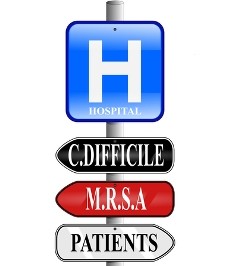
Steps to Reduce Your Risk of Acquiring a Hospital Infection
Recent studies have shown that almost 75% of patient hospital rooms are contaminated with Methicillin Resistant Staphylococcus Aureus (MRSA). This bacterium causes infections in different parts of the body and is difficult to treat because it is resistant to many antibiotics. Although the normal Staph is common and lives on our bodies, it can become problematic when it enters our bodies (often through a cut) and can cause an infection. MRSA is spread by contact, which means it spreads by touching other people or objects that are contaminated. In order to significantly decrease your risk of contamination or infection with MRSA, the Committee to Reduce Infection Deaths has come up with 15 suggestions:
-
Ask hospital staff and visitors to clean their hands before treating you or coming into contact with you when you are hospitalized;This is the single most important way to protect yourself in the hospital. If you’re worried about being too aggressive, just remember your life could be at stake. All caregivers should clean their hands before treating you. Alcohol-based hand cleaners are more effective at removing most bacteria than soap and water. Do not hesitate to say: “Excuse me, but there’s an alcohol dispenser right there. Would you mind using that before you touch me, so I can see it?” Don’t be falsely assured by gloves. If caregivers have pulled on gloves without cleaning their hands first, the gloves are already contaminated before they touch you.
-
Ask your doctor to wipe his stethoscope with alcohol before use;Stethoscopes are often contaminated with Staphylococcus aureus and other dangerous bacteria, because caregivers seldom take the time to clean them in between patient use.
-
If you need a “central line” catheter, ask your doctor about the benefits of one that is antibiotic-impregnated or silver-chlorhexidine coated to reduce infections;
-
Choose a surgeon with a low infection rate if you need surgery;Surgeons know their rate of infection for various procedures. Don’t be afraid to ask for it.
-
Beginning three to five days before surgery, shower or bathe daily with chlorhexidine soap;Various brands can be bought without a prescription. It will help remove any dangerous bacteria you may be carrying on your own skin.
-
Ask your surgeon to have you tested for methicillin-resistant Staphylococcus aureus (MRSA) at least one week before you come into the hospital;The test is simple, usually just a nasal swab. If you have it, extra precautions can be taken to protect you from infection.
-
On the day of your operation, remind your doctor that you may need an antibiotic one hour before the first incision;For many types of surgery, a pre-surgical antibiotic is the standard of care, but it is often overlooked by busy hospital staff.
-
Stop smoking well in advance of your scheduled surgery;Patients who smoke are three times as likely to develop a surgical site infection as nonsmokers, and have significantly slower recoveries and longer hospital stays.
-
Ask your doctor about keeping you warm during surgery – Operating rooms are often kept cold, but for many types of surgery, patients who are kept warm resist infection better. This can be done with special blankets, hats and booties, and warmed IV liquids.
-
Do not shave the surgical site; Razors can create small nicks in the skin, through which bacteria can enter. If hair must be removed before surgery, ask that clippers be used instead of a razor
-
Avoid touching your hands to your mouth, and do not set food or utensils on furniture or bed sheets;Germs such as “C. Diff” can live for many days on surfaces and can cause infections if they get into your mouth. All caregivers should clean their hands before treating you. About two-thirds of medical staff were unaware they should clean their hands with soap and water, because alcohol sanitizers don’t kill this superbug.
-
Ask your doctor about monitoring your glucose (sugar) levels continuously during and after surgery, especially if you are having cardiac surgery;The stress of surgery often makes glucose levels spike erratically. When blood glucose levels are tightly controlled, heart patients resist infection better. Continue monitoring even when you are discharged from the hospital, because you are not fully healed yet.
-
Avoid a urinary tract catheter if possible;It is a common cause of infection. The tube allows urine to flow from your bladder out of your body. Sometimes catheters are used when busy hospital staff don’t have time to walk patients to the bathroom. If you have a catheter, ask your caregiver to remove it as soon as possible.
-
If you must have an IV, make sure that it’s inserted and removed under clean conditions and changed every 3 to 4 days;Your skin should be cleaned at the site of insertion, and the person treating you should be wearing clean gloves. Alert hospital staff immediately if any redness appears.
-
If you are planning to have your baby by Cesarean section, follow the steps listed above as if you were having any other type of surgery;





